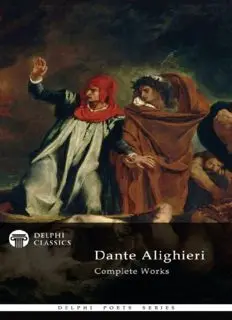
Complete Works of Dante Alighieri PDF
Preview Complete Works of Dante Alighieri
DANTE ALIGHIERI (1265-1321) Contents The Poetry Collections THE NEW LIFE THE DIVINE COMEDY (VERSE) THE DIVINE COMEDY (PROSE) The Italian Texts LIST OF WORKS The Biography DANTE: HIS TIMES AND HIS WORK by Arthur John Butler © Delphi Classics 2012 Version 1 DANTE ALIGHIERI By Delphi Classics, 2012 NOTE When reading poetry on an eReader, it is advisable to use a small font size, which will allow the lines of poetry to display correctly. The Poetry Collections Dante’s birthplace, Florence Medieval Florence by Giorgio Vasari Florence today THE NEW LIFE Translated by Charles Eliot Norton La Vita Nuova is a collection of verse and prose works written in 1295 by the Italian poet Dante Alighieri (1265–1321). Forming an expression of the medieval genre of courtly love, the collection was innovative for being written in Italian, instead of Latin – the favoured language of high literature at the time. As well as the poet’s other works, La Vita Nuova helped to establish the Tuscan dialect, promoting an Italian language that could be appreciated by readers of all backgrounds and not just the privileged few. The work contains 42 short chapters, with commentaries on 25 sonnets and several other rarer forms of poems. In the prose sections, Dante constructs a narrative of sorts between the poems; recounting his encounters with Beatrice, a young Florentine maiden he meets and falls in love with at first sight. As the poet discusses the origins and context of each poem, he also explains, often in meticulous detail, his technical decisions in composition. The chapters containing poems are composed of three parts: the semi-autobiographical narrative, the lyric that resulted from those circumstances and a brief structural outline of the lyric. La Vita Nuova was written with the purpose to elevate courtly love poetry, transposing its tropes and its language into a sacred form of love poetry. The collection is a landmark work in the development of emotional autobiography, finely delineating feelings of courtly love, as well as presenting an unprecedented insight of a poet’s workmanship. A portrait of Dante attributed to Giotto
